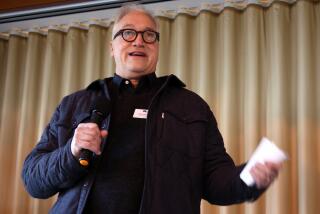MR. WNET SUMS UP PBS CAREER
- Share via
NEW YORK — New York’s WNET-TV has entered its 25th anniversary year with the knowledge that the man who has led the country’s largest public-television station for more than half its existence will be leaving. Like the rest of public television, WNET faces a challenging, if uncertain, future.
“If the change of guard at this station can be seen as a metaphor for the entire service,” said John Jay Iselin, “the question is: Where will PBS go from here?”
Iselin, 53, who plans to remain at the station until June, had good reason to talk in metaphorical terms. Under his leadership, WNET has grown in size, stature and audience--and fueled similar growth by the Public Broadcasting Service.
Since Iselin joined the station as general manager in 1971--he was named president in 1973--WNET’s annual budget has grown from $18 million to the current $81.3 million, down from a record $101 million in 1984-85.
And under his administration, such popular PBS series as “Great Performances,” “American Playhouse,” “The MacNeil/Lehrer NewsHour,” “Nature” and “Adam Smith’s Money World” have been established, and special series such as “Heritage: Civilization and the Jews” and “The Brain” have been mounted.
The New York station produces, co-produces or acquires about 40% of PBS’ national prime-time programming.
“We have brought into being a wave of programs that have come to define public television, (and have) heightened expectations and increased viewership,” Iselin said.
To accomplish this, WNET has often operated and produced beyond its means. And as federal and corporate support for public television has diminished, the station has suffered the consequences, from periodic financial crises to more permanent cutbacks in operations and staff.
“The great challenge now is to find new sources of revenue with which to capitalize the system and fill the program pipeline,” Iselin said, calling that task the “paramount urgency” facing PBS. He was repeating the theme sounded by PBS President Bruce Christensen last fall at the annual meeting of programming officials from stations around the country.
Ironically, some observers here and elsewhere within PBS believe that Iselin’s ambitions for WNET led not only to its accomplishments but also to his own unexpected resignation.
“Jay was pulling a very big wagon, and many of us often wondered how long he could go it alone,” one veteran broadcaster said, referring to Iselin’s increasingly tough battle to win moral support from WNET’s board of trustees and financial support for the station’s projects.
“No doubt some have looked for relief from the tension between the desire to excel and to survive,” Iselin said.
However, an unusually subdued Iselin defended his record and recommended that all of PBS take a similarly aggressive approach.
“We have not made imprudent judgments,” he said. “It’s appropriate to first come up with ideas. Ideas provide the stimulus that makes things happen. They can be tested, implemented or reluctantly withdrawn. But you don’t just stop taking risks, play it safe, close up shop or go home.
“People used to say we could never put live performances on the air, or introduce the essay format, or work with independent producers or map a series of American drama . . . ,” Iselin said, reciting the various program ideas that have become reality under his administration.
“We have met the mandate set out for PBS, and now it is a matter of being able to maintain that quality of programming.”
As Christensen did in his speech, Iselin spoke of the need for more cooperation among the traditionally independent public stations. He cited as an example the success of “American Playhouse,” produced by a consortium of stations, including WNET and Los Angeles’ KCET-TV.
He also stressed the need for increased co-production with international partners. On the day he announced his resignation in October, for instance, Iselin also announced a long-term agreement between WNET, KCET and other U.S. public-TV stations with Japan’s NHK network to produce a series of programs about Japan.
Iselin said public television should also set a goal of increasing its support from local and state governments, viewers and new underwriters by as much as 15%. He was clear-eyed on the difficulty in reaching the goal in the current economic climate, and he seemed to understand that many smaller stations around the country would have a particularly difficult time reaching such a goal.
But he displayed his customary enthusiasm and optimism: “Life should be an adventure, and there has been no greater adventure than these years of growth for public television.”
More to Read
The complete guide to home viewing
Get Screen Gab for everything about the TV shows and streaming movies everyone’s talking about.
You may occasionally receive promotional content from the Los Angeles Times.






